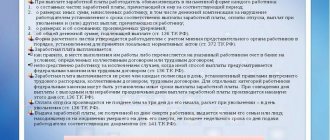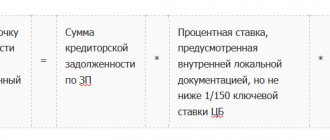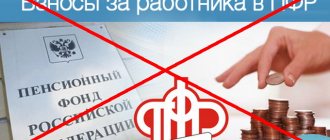The essence of the scheme for using “gray” wages
“Gray” or “shadow” wages should be considered that part of an employee’s earnings that is given to him unofficially (in envelopes) and is not taken into account for tax purposes (Letter of the Federal Tax Service of Russia for Moscow dated 08.08.2007 No. 15-08/075418).
When applying this scheme, the person hired is assigned a salary in the employment contract in an amount equal to the minimum wage, or slightly higher. The rest of the earnings (usually it turns out to be significantly more than indicated in the employment agreement) is paid unofficially.
The employer sees the following benefits in using “gray” payments:
- from the “gray” part, he does not need to fulfill the duties of a tax agent for paying personal income tax (amounting to 13% of income), nor pay insurance premiums (the total amount of which depends on the amount of payments for accident insurance, because of this it ranges from 30. 2% to 38.5% of income and may additionally increase by 2-14% due to charges for payments to persons working in harmful or dangerous conditions);
- the size of the “gray” part can be reduced by him for one reason or another, which is not officially stated anywhere, and the employee will not be able to challenge such a reduction;
- systematic delays in “gray” payments are possible, and it is difficult for the employee to influence this situation;
- the “gray” part may not be paid at all or paid at a reduced rate for periods of regular vacations and sick leave;
- upon dismissal in a conflict situation, the reality becomes the non-payment to the employee of the “gray” part of the earnings that turned out to be unpaid on the day of dismissal and the “gray” part of vacation pay corresponding to the unused number of days of the next vacation (if this additional payment was applied).
Thus, the amount of material benefit for the employer can be quite significant. And it also acquires a very effective tool for influencing employee behavior.
“Black” wages – the pros and cons of going to court
As part of the lawsuit, the plaintiff may experience emotional difficulties. Often, employer representatives exert pressure. Also, the civil judicial process is not easy for the average person; it is necessary to take into account legal subtleties. In court, emotions have no power, only facts. Even if the judge is on the plaintiff’s side, he will not be able to do anything if there is no evidence that the plaintiff is right. But there are also positive aspects - payment of compensation.
The plaintiff may request payment in the claim:
- salaries for the entire period of debt;
- late fees;
- compensation for moral damage;
- repayment of expenses for a representative;
- expenses for legal fees.
The collection of compensation for moral damage is not related to the collection of compensation for property damage. The amount of moral damage is determined by the plaintiff independently and stated in the claim. The court may change the amount of payment based on principles of fairness. The late fee is daily 1/300 of the refinancing rate. The beginning of the term is the date of the due payment, the end is the day of the actual settlement.
Signs of payment of “gray” wages for the Federal Tax Service
The fact that salaries are paid in envelopes rarely remains a secret to the tax authorities. Direct evidence of this is:
- complaints received from current or former employees;
- information about the amount of earnings reflected on the Internet in data about the employer’s vacancy;
- a certificate of a higher level of income of the employee, issued by the employer;
- statements for the payment of “gray” salaries discovered during the audit.
Reasons to doubt the reality of the officially shown salary arise when establishing earnings:
- in a volume below the industry average or the regional market average;
- without differentiation of incomes of managers and ordinary employees;
- in an amount significantly lower than at the previous place(s) of work.
Indirect evidence of the discrepancy between income and their real level is the purchase by an individual of property recorded in the Federal Tax Service (real estate, transport, land), the cost of which is not comparable with his official earnings.
Where to go to prove the real amount of wages
In order to appeal the amount of wages, the employee will have to go to court, since in this case it will be a dispute with the employer over the amount of wages.
Such disputes are beyond the competence of the prosecutor's office and the labor inspectorate. Thus, an employee with a black salary has no choice but to prove the black salary in court. This is the only way for him to receive the entire amount earned in the event of a delay in salary or failure to receive full payment upon dismissal.
Tax consequences of “gray” payments for the employer
The employer's tax liability for “gray” payments is directly related to non-payment of personal income tax and insurance contributions on the unofficial part of earnings. Responsibility for these charges arises under various articles of the Tax Code of the Russian Federation:
- For insurance premiums, Art. 122, which specifies 2 fine rates calculated from the amount of the unpaid payment - 20% (clause 1) and 40% (clause 3). To apply a higher rate, intent to understate the tax base must be revealed. When using a “gray” payment scheme, there is intent, so accruals will be made precisely from it.
- For personal income tax, in respect of which the employer is a tax agent, Art. 123, which provides only 1 rate option for calculating a fine - 20%.
However, tax risks are not limited to this, since the fact of establishing a “gray” salary entails suspicions that the employer has systematically hidden income from which such payments are made. Accordingly, during tax control, data on revenue will be carefully checked, the underestimation of the volume of which leads to a reduction in the tax bases for VAT, income tax, simplified tax system or unified agricultural tax. Tax liability for these taxes, as well as for insurance premiums, will arise under Art. 122 of the Tax Code of the Russian Federation.
Sanctions applied under Art. 122 of the Tax Code of the Russian Federation, do not relieve the taxpayer from the need to pay additional unpaid taxes, as well as pay penalties for late payment (clause 5 of Article 108 of the Tax Code of the Russian Federation). Therefore, the total amount of additional payments can be quite significant.
Exactly the same payments (unpaid tax and related penalties) will have to be made for personal income tax, since clause 9 of Art. 226 of the Tax Code of the Russian Federation, which prohibits the payment of this tax at the expense of a tax agent, since 01/01/2020, additions have been made allowing the Federal Tax Service to demand payment of its amounts additionally accrued based on the results of a tax audit. The personal income tax paid in such a situation will not reduce the tax base for taxes depending on the volume of revenue received (Letter of the Federal Tax Service of Russia dated March 10, 2020 No. SD-4-3/4109).
Of course, the specific amount of additional tax assessments by the Federal Tax Service will have to be justified (clause 6 of Article 108 of the Tax Code of the Russian Federation). However, tax authorities can only collect part of the evidence on their own. They will be supported by facts and the collection of additional information will be carried out by the investigative authorities (Letter of the Federal Tax Service of Russia dated July 13, 2017 No. ED-4-2 / [email protected] ).
Administrative and criminal liability of officials
For officials of an employer-legal entity, the consequence of paying “gray” wages may be bringing them to administrative as well as criminal liability.
Administrative liability when identifying “gray” payments arises in connection with gross distortion of accounting and accounting data, leading to an understatement of taxes by more than 10% or a distortion of any of the financial reporting indicators by more than 10% (Note 1 to Article 15.11 of the Code of Administrative Offenses of the Russian Federation) . With systematically carried out “gray” payments, both of these indicators in relation to the period under review can reach a value sufficient to apply an administrative fine. Its size will be (Article 15.11 of the Code of Administrative Offenses of the Russian Federation):
- from 5 thousand rubles. up to 10 thousand rubles when a violation is detected for the first time (clause 1);
- from 10 thousand rubles. up to 20 thousand rubles. in case of repeated offense (clause 2).
In case of repeated violation, the fine may be replaced by disqualification for a period of 1 to 2 years.
Criminal liability due to “gray” payments arises under Art. 199 of the Criminal Code of the Russian Federation. To apply this liability, the volume of violations committed must be large (over 15 million rubles) or especially large (more than 45 million rubles) for 3 consecutive financial years (Note 1 to Article 199 of the Criminal Code of the Russian Federation).
In case of major violations, the punishment is (Clause 1 of Article 199 of the Criminal Code of the Russian Federation):
- a fine of 100 thousand rubles. up to 300 thousand rubles. or in the amount of salary or other income of the convicted person for a period from 1 to 2 years;
- forced labor for up to 2 years with deprivation of the right to hold certain positions or carry out certain activities for up to 3 years or without specifying a period;
- arrest for up to six months or restriction of freedom for up to 2 years with deprivation of the right to hold certain positions or carry out certain activities for up to 3 years or without specifying a period.
For especially major violations or acts committed by a group of persons by prior conspiracy, the punishment will be (Clause 2 of Article 199 of the Criminal Code of the Russian Federation):
- a fine of 200 thousand rubles. up to 500 thousand rubles. or in the amount of salary or other income of the convicted person for a period from 1 to 3 years;
- forced labor for up to 5 years with deprivation of the right to hold certain positions or carry out certain activities for up to 3 years or without specifying a period;
- restriction of freedom for up to 6 years with deprivation of the right to hold certain positions or carry out certain activities for up to 3 years or without specifying a period.
A person who has committed a crime for the first time may be released from criminal liability if he or the legal entity in relation to which this crime took place fully pays all amounts of missing taxes, as well as related penalties and fines accrued in accordance with the Tax Code of the Russian Federation (Note 2 to Article 199 of the Criminal Code of the Russian Federation).








